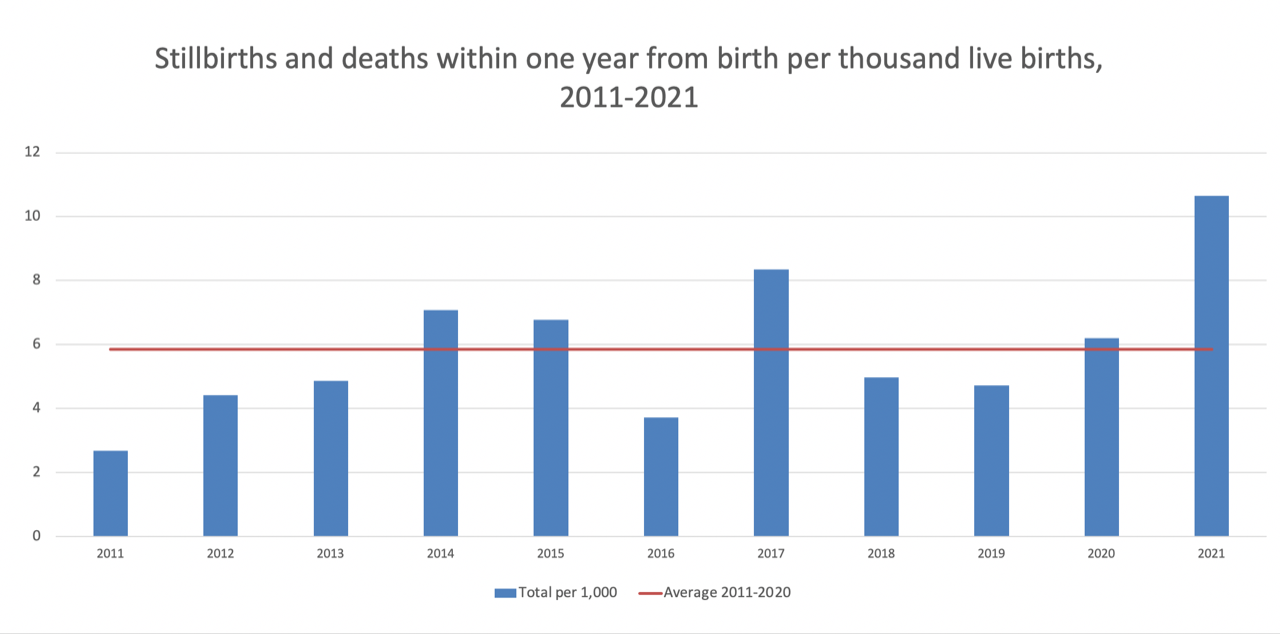In 2021, 17 stillbirths and 35 first-year infant deaths were reported in Iceland, a total of 52, against 28 in 2020 in the island nation of 366,000 people. The rate of stillbirths almost doubled compared with the 2011-2020 average. In 2020 there were two stillbirths per 1,000 live births, but in 2021 there were 3.5. First-year infant deaths more than doubled, from an average of 3.5 per 1,000 to 7.2. Taken together the 2021 figure was 10.7 per 1,000, an 82% rise on the 10-year average of 5.9 per 1,000 (see above). These startling figures were reported by Icelandic daily Frettin, based on new data from Statistics Iceland.
Some studies have indicated a possible relationship between stillbirths and COVID-19 infection while others have found no relationship. In Iceland, almost 6,000 cases of COVID-19 were reported in 2020 and 21,000 in 2021, almost a third of those during the final month of the year as Omicron arrived. The first year of the COVID-19 pandemic, 2020, saw no increase in stillbirths or newborn deaths above the average. No infant deaths have been attributed to COVID-19 according to official data. Mass vaccination against COVID-19 began early 2021 and by July 15th, 70% of the population had been fully vaccinated. Eleven cases of foetal damage following vaccination had been reported to the Icelandic Medicines Agency by April 2022.
Little research is yet available on vaccine safety for pregnant women, though there is no shortage of articles recommending pregnant women get vaccinated to protect their unborn child against COVID-19, a minuscule risk. A study published in early 2021 purportedly proving vaccination to be safe for pregnant women turned out to be so poorly designed its conclusion was invalid and had to be corrected. This didn‘t prevent its findings from being used around the world to justify the vaccination of pregnant women.
Some anecdotal evidence for a relationship between vaccination and rate of miscarriage or stillbirths has appeared. A recent U.S. CDC study indicates vaccination during pregnancy is safe, but it suffers from several serious flaws, including mismatch between study conclusions and underlying data showing a considerable increase in the risk of preterm birth among vaccinated women, badly matched cohorts and a lack of mothers vaccinated in the first trimester. It must also be kept in mind that all indications of safety concerns for pregnant women are vigorously suppressed by so-called ‘fact-checkers’ and scientific and mainstream media. Recent Israeli data however indicate a 33% relative increase in probability of stillbirth among vaccinated women. U.K. data signify a similar risk. The released Pfizer trial documents show that in animal trials the vaccine quantity increases substantially in the ovaries during the 48 hours after the injection. Until further research is available, those indications, along with reports of foetal damage following vaccination, support worries that vaccination played a part in the sudden jump in stillbirths and infant deaths in Iceland in 2021.
Thorsteinn Siglaugsson is an economist who lives in Iceland. Find him on his blog.















To join in with the discussion please make a donation to The Daily Sceptic.
Profanity and abuse will be removed and may lead to a permanent ban.